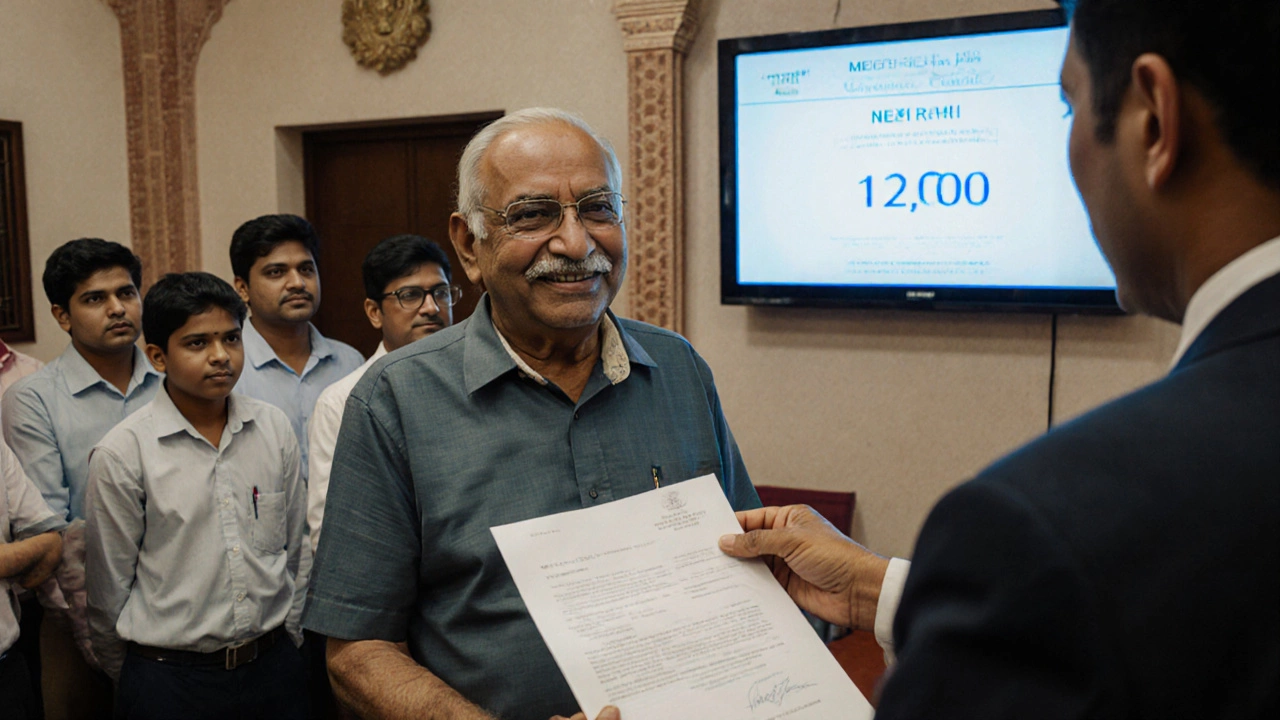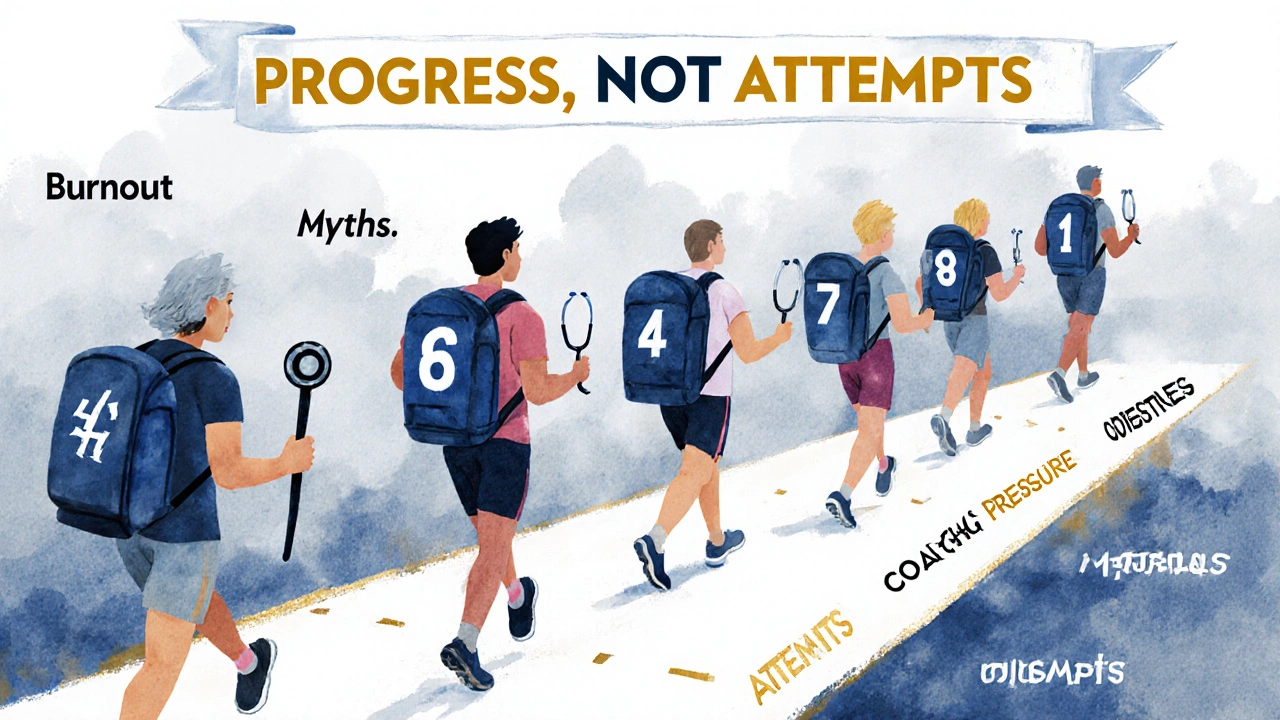NEET Eligibility & Attempt Tracker
NEET Eligibility Checker
Your Attempt History
Remember: There's no official limit on NEET attempts.
Important Medical colleges don't check your attempt history. They only consider your current NEET score and rank.
How to make your attempts count
- Analyze your previous papers and identify weak areas
- Stop memorizing, start understanding concepts
- Practice timed mock tests weekly
- Don't ignore NCERT textbooks
- Manage stress through sleep and exercise
There’s no official limit on how many times you can take the NEET exam. That’s right-no matter how many times you’ve tried before, you can keep showing up. The National Testing Agency (NTA), which runs NEET, doesn’t set a cap on attempts. Whether it’s your first try or your sixth, you’re still eligible as long as you meet the basic age and qualification requirements.
Why This Matters for Repeater Students
Every year, over 200,000 students retake NEET. Many of them are repeat candidates who didn’t get the rank they needed for their dream medical college. For them, knowing there’s no hard stop on attempts brings relief. It means you don’t have to rush. You don’t have to settle for a lower score just because you’re running out of chances.
But here’s the catch: just because you can keep trying doesn’t mean you should keep trying the same way. The real challenge isn’t the number of attempts-it’s how you use them. Students who improve their scores over multiple tries usually do one thing differently: they fix their preparation strategy, not just their study hours.
Who Can Take NEET? The Real Eligibility Rules
While there’s no limit on attempts, there are two non-negotiable eligibility conditions:
- Age: You must be at least 17 years old by December 31 of the year you’re appearing. There’s no upper age limit, so even someone in their 30s can sit for NEET if they meet the other criteria.
- Educational Qualification: You need to have passed Class 12 or equivalent with Physics, Chemistry, Biology/Biotechnology, and English as core subjects. You must have scored at least 50% in PCB (40% for SC/ST/OBC, 45% for PwD candidates).
These rules stay the same every year. Even if you took NEET five times and failed to clear the cutoff, you can still apply next year-if you still have your Class 12 certificate and you’re over 17.
What Happens If You’ve Tried Five Times Already?
Some students believe there’s a hidden limit. They hear rumors that after three or five attempts, colleges won’t consider them. That’s false. Medical colleges in India don’t ask for your attempt history on the admission form. They only look at your current year’s score and rank.
For example, a student from Varanasi took NEET six times. Their scores improved from 380 to 510 over five years. They got into a government medical college in their sixth attempt. No one asked how many times they’d tried. Their rank was 12,000. That’s what mattered.
The system doesn’t penalize persistence. It rewards improvement.

Why Do People Think There’s a Limit?
Confusion comes from coaching centers. Many coaching institutes tell students they have only three or four attempts left. Why? Because they want you to enroll in their crash courses or premium packages. They profit from your fear of running out of chances.
Some state-level counseling bodies used to have attempt limits in the past-for example, in states like Maharashtra or Karnataka, there were temporary rules for state quota seats. But those have been scrapped. NEET is now a single, national-level exam with uniform rules across India.
Always check the official NTA website before making any decisions. Don’t trust what a coaching agent says. Look at the latest NEET information bulletin. It’s published every year in December. That’s your only reliable source.
How to Make Each Attempt Count
If you’re planning to retake NEET, here’s what actually works:
- Analyze your previous papers: Don’t just look at your score. Look at which topics you kept missing. Was it organic chemistry? Human physiology? Make a list of your weak areas and tackle them one by one.
- Stop memorizing, start understanding: NEET tests application, not recall. If you’re memorizing facts without knowing how they connect, you’ll keep getting stuck on tricky questions.
- Practice timed mocks weekly: Your speed matters as much as your accuracy. A student who scores 600 in untimed practice but only 480 in the actual exam is losing time on 30+ questions. Fix that.
- Don’t ignore NCERT: Over 80% of NEET questions come directly from NCERT textbooks. If you’re skipping them to chase coaching modules, you’re wasting time.
- Manage stress: Burnout is the silent killer of repeat candidates. Sleep, exercise, and breaks aren’t luxuries-they’re part of your study plan.
Real Stories: Those Who Kept Going
Meet Priya from Patna. She failed NEET twice. Her first attempt: 392. Second: 410. She took a year off, worked part-time, and studied with free YouTube resources. Her third attempt: 587. She got into AIIMS Bhopal.
Raj from Rajasthan tried four times. He kept falling short by 10-15 marks. He switched from coaching classes to self-study, used only NCERT and past papers, and focused on reducing silly mistakes. His fourth attempt: 621. He’s now in his second year of MBBS.
These aren’t outliers. They’re proof that persistence, when paired with smart strategy, pays off.

What’s the Highest Number of Attempts Ever Recorded?
There’s no official record of the most attempts made by a single candidate. But anecdotal reports suggest some students have taken NEET seven or eight times. One case from Telangana involved a candidate who appeared nine times. They finally cracked it at age 31 and are now working as a doctor in a rural hospital.
These stories aren’t about being stubborn. They’re about having a clear goal and refusing to give up on it.
When Should You Stop Trying?
There’s no rule saying you must keep going. But the decision to stop should come from reflection, not frustration.
Ask yourself:
- Are my scores improving year over year-even by 10-15 marks?
- Am I learning something new each time, or just repeating the same mistakes?
- Is my mental and physical health suffering because of this?
- Have I explored other paths in healthcare-like nursing, physiotherapy, or biomedical science?
If your scores are stuck and you’re burning out, it might be time to reconsider your options. But if you’re getting better, even slowly, keep going. The system is built to let you.
Final Word: It’s Not About Attempts. It’s About Progress.
NEET isn’t a race with a fixed number of laps. It’s a marathon where you can pause, reset, and start again. The number of attempts doesn’t define you. Your growth does.
There’s no ceiling on how many times you can try. But there’s a limit to how much you can improve if you don’t change your approach. So if you’re planning your next attempt, don’t just study harder. Study smarter. And remember-your next score might be the one that changes everything.
Is there a limit on how many times I can take NEET?
No, there is no official limit on the number of attempts for NEET. The National Testing Agency (NTA) allows candidates to appear as many times as they want, as long as they meet the minimum age and educational eligibility requirements.
Can I take NEET after 30 years of age?
Yes, you can. There is no upper age limit for NEET. Candidates must be at least 17 years old by December 31 of the exam year, but there is no maximum age. Many repeat candidates in their 30s have successfully cleared NEET and joined medical colleges.
Do medical colleges check how many times I’ve taken NEET?
No, medical colleges do not ask for your attempt history during counseling or admission. They only consider your latest NEET score and rank. Your previous attempts have no impact on your eligibility for admission.
Why do coaching centers say I only have 3 or 4 attempts?
Coaching centers often spread this myth to pressure students into buying expensive courses or packages. There is no such rule in the official NEET guidelines. Always verify information from the NTA website, not from coaching agents.
What should I do if my NEET score isn’t improving?
If your score is stuck, stop increasing study hours and start analyzing your mistakes. Focus on NCERT, take timed mock tests weekly, and identify patterns in your errors. Many students improve significantly by switching from rote learning to conceptual understanding. Consider seeking feedback from a mentor or former NEET topper.
Is it worth taking NEET for the fifth or sixth time?
If your scores are steadily improving and you’re still passionate about becoming a doctor, then yes. Many students have cleared NEET on their fifth or sixth attempt. The key is not the number of tries-it’s whether you’re making smarter, data-driven improvements each time.
If you’re considering your next NEET attempt, remember: the system doesn’t count your tries. It only counts your score. So keep going-if you’re learning, you’re winning.






